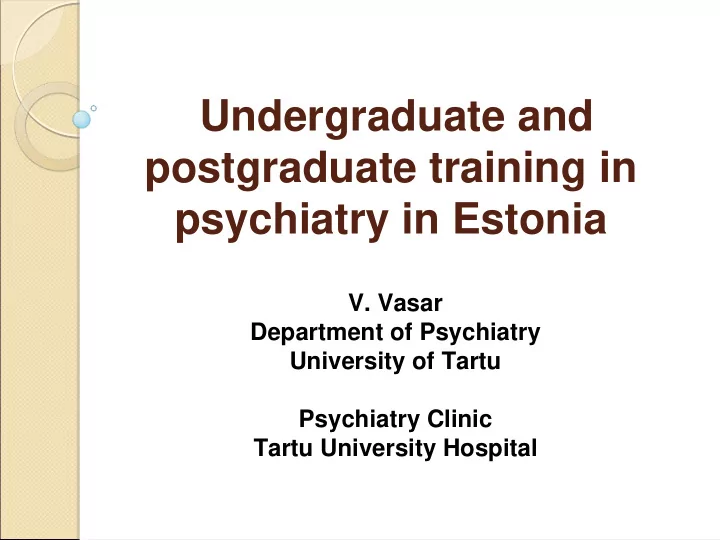

Undergraduate and postgraduate training in psychiatry in Estonia V. Vasar Department of Psychiatry University of Tartu Psychiatry Clinic Tartu University Hospital
Undergraduate and postgraduate training in psychiatry in Estonia University of Tartu, Faculty of Medicine Doctoral (PhD) studies 4 years (240 ECTS) Undergraduate training (360 ECTS) Residency official standard study CME CME period is 6 years 3-5 years Students who have completed Medicine may continue in doctoral programmes or enter residency training to receive a qualification of specialist doctor. Residency is a three- to five-year programme
Training course in psychiatry for medical students 10 ECTS gredits ( European Credit Transfer and Accumulation System ) ◦ 10 ECTS gredits = 260 h of training (including homework) One credit point corresponds to 26 hours of studies (lectures, seminars, practice, homework or independent work, assessment of learning outcomes) performed by a student. ◦ Psychiatry is taught on the 5th year Training course in psychiatry for medical students includes two major modules: ◦ Clinical psychology (approximately 1/3 of total course) ◦ Psychiatry (incl. child and adolescence psychiatry!)
Undergraduate training in psychiatry 10 ECTS gredits homework or independent work (130 hours) Seminars and practical training in clinical psychology Introductory and psychiatry - 6 weeks (110h) lecture course in September clinical psychology psychiatry – 4 weeks 20 h - 2 weeks seminars - 15-25 students in group practical works - 6 - 8 students in group Assessment Assessment of learning of learning outcomes 2 outcomes 1 Examination
Description of the current grading system in UT is the following: Tartu University Grade % of acquired knowledge A - excellent 91-100% B - very good 81-90% C - good 71-80% D – sufficient 61-70% E – poor 51-60% F - fail 0-50%
Evaluation of teaching and courses in UT Evaluation of teaching and courses in UT Academic Affairs Office administers teaching and course evaluations UT Study Information System (SIS) ◦ the survey is anonymous and the form must be completed on the Study Information System web page fhe aim of the evaluation process is to get regular feedback from students regarding the quality of teaching and the courses Teachers will be able to use evaluation results to improve the content and presentation of their courses Evaluation results will also be used in deciding on the accreditation of curricula
Postgraduate training Undergraduate training Doctoral (PhD) Specialisation studies – (residency) 3-5 years 4 years incl. psychiatry, neurscienses Estonian Psychiatric Assotsiation CME
Postgraduate training (PGT) The council of the University of Tartu has approved: 1) general guideline for specialisation ◦ rules for admission to residency (selection procedure) ◦ rules for study programs each specialty has a study program, ◦ Study regulations* ◦ Supervision Progam Director Supervisor ◦ Rules for assessment during studies ◦ Rules for training in other countries* ◦ Rules for final examination 2) Study (training) programs The residency training of medical specialists is currently performed according to 40 different programmes
Council of the university Faculty of medicine DEAN'S OFFICE Council of Dean the faculty Vice-dean Vice-dean Vice-dean (postgraduate (undegraduate (research) training) training) Committee of postgraduate training Departments Progam Directors Hospital (Clinical) supervisors Residents (health care service provider) (41)
Program director director and and supervisor supervisor Program Progam director ( üldjuhendaja ) ◦ is appointed by the dean or vice-dean ◦ is responsible for entrance and final examination ◦ in co-operation with residents confirms individual training plans for next year ◦ is responsible for the annual assessment of the trainee’s progress as well as the final evaluation ◦ makes proposals to faculty for changes in training program Supervisor ( juhendaja ) ◦ should have at least 5 years experience in specialist psychiatry ◦ is appointed by the hopsital ◦ is supervising clinical activities of the resident during practical course ◦ is responible for the assessment at end of practical training course
Specialisation in psychiatry Specialisation in psychiatry (4 y) (4 y) Practical training Theoretical training Obligatory courses 30 ECTS gredits - Minimal total duration 38 months Addition courses - Maximal total duration 6 months
Obligatory practical training courses a cute (emergence) psychiatry – at least10 months general psychiatry – at least10 months child and adolescent psychiatry – at least 6 months outpatient psychiatry – at least 9 months neurology – at least 3 months at least 6 months have to be done in the university clinic
Practical training courses by choice (total duration 6 months) Internal medicine (cardiology, endocrinolgy, ….) Emergence medicine Substance use disorders* Eating disorders* Evidence based psychiatry* Training in other EU countries
Theoretical training 30 ECTS gredits Theoretical training courses for psychiatry residents – 20 ECTS Psychotherapy - 6 ECTS Theoretical courses in other areas of medicine by choice – 4 ECTS
Assessment of the trainee’s progress Assessment at the end of each practical course by the supervisor ◦ each resident has personal supervisor ◦ special form is used for assessment twice in year by the program director and at the end of residency ◦ the trainee should keep his/her personal log book and to regist all activities (pratical training, passed theoretical courses, etc) the final examination completing residency training is given in front of a committee the residency certificate and the academic report is issued by the UT
Recommend
More recommend